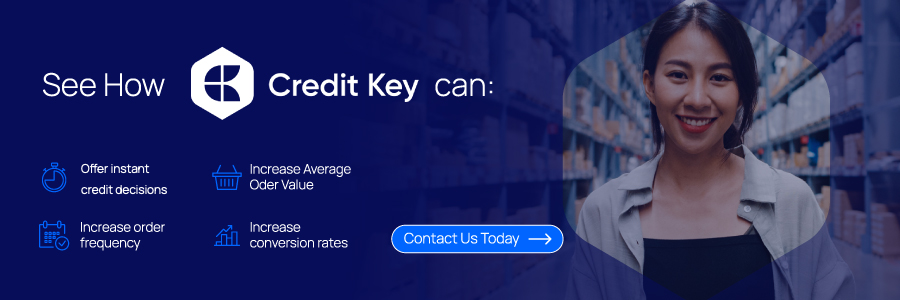In recent years, the Buy Now, Pay Later (BNPL) model has become increasingly popular throughout the eCommerce world.
And it’s going to keep growing from here on out. In fact, CB Insights suggests that, by 2025, the global BNPL industry will grow 10-15x its current volume — topping $1T in annual gross merchandise volume.
For eCommerce companies, BNPL providers like Affirm, Klarna, PayPal Credit, and After Pay have become household names. With large eCommerce giants like Amazon now offering Affirm to select customers, the writing is on the wall:
Buy Now, Pay Later is quickly becoming a go-to payment method for the modern consumer.
Because of this, B2B companies are now looking to offer BNPL options to their customers, as well. Unfortunately, because B2B-focused BNPL services are less known on the market, many B2B teams are resorting to those that cater mainly to a B2C audience.
This may perhaps be better than not offering a BNPL option to their customers at all — but it also may cause more problems than it’s worth. The truth is, most B2B companies that use a B2C BNPL solution ultimately get less utilization and value from it than their B2C counterparts.
Here, we’ll take a look at some of the key reasons B2C Buy Now, Pay Later solutions just do not work for your B2B company — and why a dedicated B2B solution is your best option.
Why B2C BNPL Solutions Don’t Work for B2B Companies
Overall, there are two key reasons why B2B companies shouldn’t rely on B2C-focused BNPL solutions.
Low Loan Amounts Offered
B2C BNPL solutions help consumers finance purchases that are a bit more expensive than what they typically spend.
A few examples of commonly-financed consumer products:
- Exercise equipment
- Designer clothing
- Jewelry
...and more.
While these products may be pretty costly from the consumer’s point of view, the price tag pales in comparison to what most B2B companies would consider “expensive”.
See where we’re going with this?
Typically, B2C BNPL providers offer consumers credit lines of up to $10,000 to cover what is, to them, a large expense. For growing B2B companies, $10,000 isn’t going to go far at all.
Worse yet, $10,000 is usually the maximum amount a B2C-focused provider can offer. Even if this relatively small amount would cover the cost of a major business expense, there’s no guarantee the buyer will actually receive that amount in full.
(In our experiences, we’ve found that most B2B companies using B2C solutions only get approved for around $2,500 — leaving them well short of the amount needed to make a big purchase.)
Creditworthiness of Applicant
The other major issue with using a B2C BNPL solution is in how applications are processed.
Because they cater to consumers, B2C BNPL providers use personal credit scores and credit histories to assess an applicant’s creditworthiness.
That said, the owner (or another representative of the company) will need to provide their own financial records to receive the funds requested. Any blemishes on their personal credit report may cause the business to receive less than they’d anticipated — if they get approved at all.
Similarly, the business’ financial standing doesn’t factor into the equation at all. Even if everything within the company is on the up and up, the terms received will be based solely on the individual applicant’s circumstances.
Why Your Company Needs a Dedicated B2B Buy Now, Pay Later Solution
With just the above in mind, it’s pretty obvious that a B2C-focused BNPL solution isn’t right for your B2B company.
Still, it’s worth taking a look at what you stand to gain by going with a dedicated B2B BNPL service.
Bigger Credit Lines
B2B Buy Now, Pay Later services are created with the modern B2B buyer in mind.
In other words, they expect to be financing rather large sums to their vendors and their customers. Credit Key, for example, offers instant credit lines of up to $50,000 and up to $200,000 with additional paperwork.
This monetary difference also impacts the amount of friction experienced throughout the approval process. While a B2C BNPL service may heavily scrutinize an application for $10,000, their B2B counterpart will likely be able to approve that same amount (or more) with ease.
Assessing Business Financials
In contrast to B2C BNPL solutions, B2B-focused providers use a vendor’s business credit report to assess their creditworthiness.
This is beneficial for a couple reasons.
For one, the owner’s (or applicant’s) personal financial history doesn’t matter here. If they do happen to have any blemishes on their personal credit report, it won’t factor into the business’ ability to receive financing.
Secondly, a dedicated B2B BPNL company knows what to look for when assessing a business’ credit report. This allows them to quickly identify creditworthy applicants — and just as quickly approve and process their application.
On top of providing more financial assistance to B2B vendors, these more dedicated BNPL services are simply better equipped to serve said vendors, overall.
Matthew Osborn
For the better half of a decade, Matthew has been submerged in the B2B Payments and Accounts Receivable as a Service space. As the Marketing Director of Credit Key, Matthew has an in-depth knowledge of sales and demand generation growth strategies.
View All ArticlesTopics from this blog: B2B Payments Wholesale E-commerce
